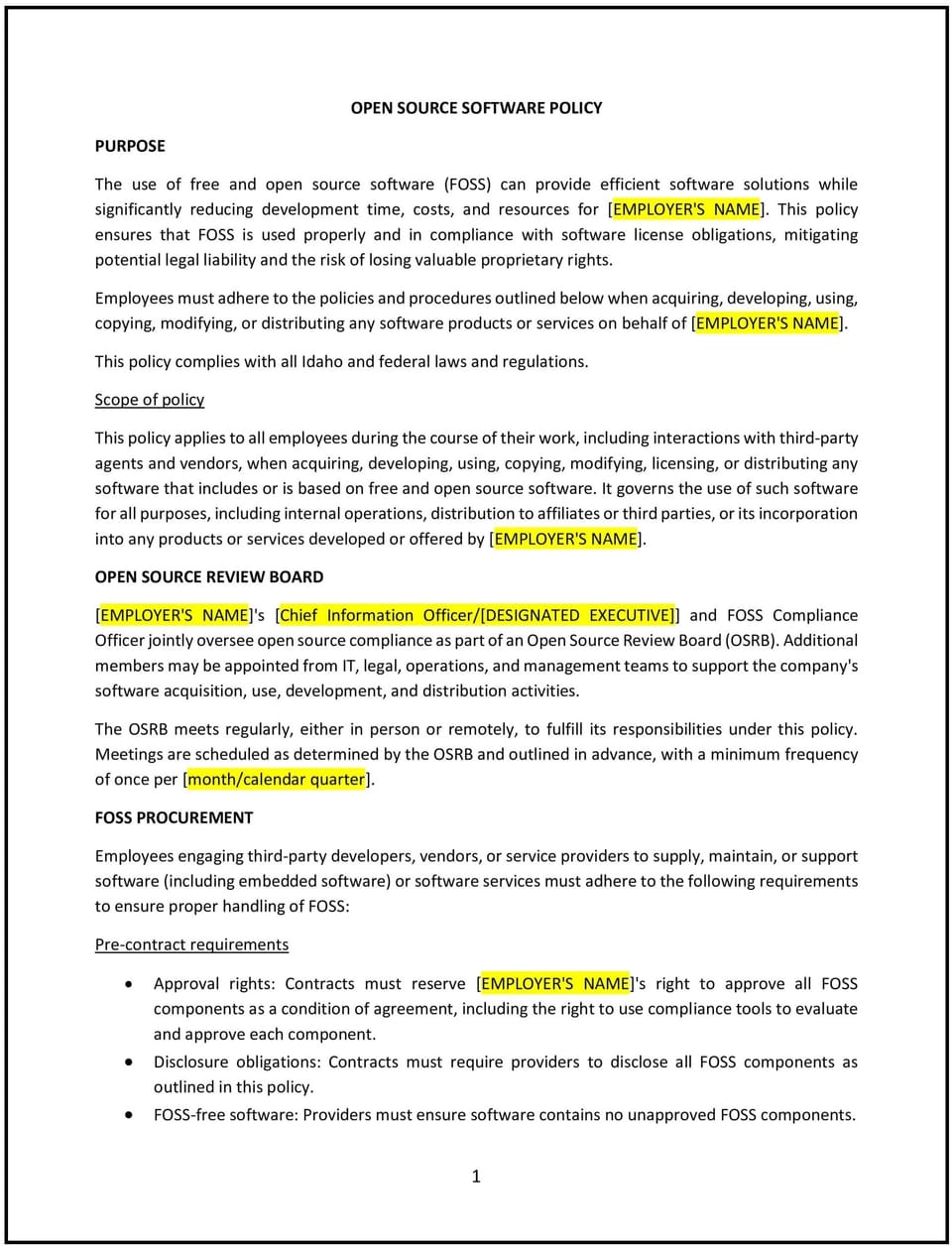Open source software policy (Idaho): Free template

Open source software policy (Idaho)
An open source software policy helps Idaho businesses establish guidelines for using, contributing to, and managing open source software (OSS) within their operations. This policy outlines procedures for evaluating OSS licenses, addressing security risks, and ensuring proper attribution and compliance with licensing terms. It also emphasizes the importance of balancing innovation with risk management when leveraging OSS.
By implementing this policy, businesses can harness the benefits of open source software while protecting their intellectual property, maintaining security, and fostering responsible use.
How to use this open source software policy (Idaho)
- Define the scope: Specify which types of open source software are covered by the policy, including software used internally, distributed to customers, or incorporated into proprietary products.
- Establish evaluation procedures: Create a process for reviewing OSS licenses, security risks, and compatibility with business goals before adopting or contributing to open source projects.
- Address licensing requirements: Outline guidelines for complying with OSS license terms, such as providing attribution, sharing modifications, or avoiding proprietary use of copyleft-licensed software.
- Manage contributions: Provide procedures for employees contributing to open source projects, including obtaining approval, documenting contributions, and ensuring they align with the business’s interests.
- Monitor security risks: Implement measures to assess and mitigate security vulnerabilities in OSS, such as regular updates, vulnerability scans, and adherence to secure coding practices.
- Train employees: Educate employees on the policy, including how to evaluate OSS, comply with licensing terms, and contribute responsibly to open source projects.
- Review and update the policy: Periodically assess the policy’s effectiveness and make adjustments based on changes in OSS trends, business needs, or Idaho laws.
Benefits of using this open source software policy (Idaho)
This policy provides several advantages for Idaho businesses:
- Encourages innovation: Open source software provides access to cutting-edge tools and technologies, enabling businesses to innovate and stay competitive.
- Reduces costs: Leveraging OSS can lower software development and licensing expenses, freeing up resources for other business priorities.
- Enhances transparency: Open source software allows businesses to review and modify code, improving transparency and reducing reliance on proprietary vendors.
- Supports collaboration: Contributing to open source projects fosters collaboration with the developer community and enhances the business’s reputation.
- Manages risks: The policy helps businesses address legal, security, and operational risks associated with using and contributing to OSS.
- Promotes responsible use: Clear guidelines ensure employees use and contribute to open source software in a way that aligns with the business’s goals and values.
Tips for using this open source software policy (Idaho)
- Communicate the policy clearly: Share the policy with employees through onboarding materials, training sessions, or internal communication platforms to ensure awareness and understanding.
- Create an OSS review board: Establish a team responsible for evaluating open source software, assessing risks, and approving its use or contribution.
- Document OSS usage: Maintain an inventory of all open source software used by the business, including license types, versions, and any modifications made.
- Monitor license compliance: Regularly review OSS usage to ensure compliance with licensing terms, such as providing attribution or sharing modifications.
- Stay informed about OSS trends: Keep up-to-date with developments in the open source community, including new licenses, security vulnerabilities, and best practices.
- Review the policy regularly: Update the policy as needed to reflect changes in OSS trends, business needs, or Idaho laws.
Q: Why should Idaho businesses have an open source software policy?
A: An open source software policy provides guidelines for using and contributing to OSS, helping businesses balance innovation with risk management and legal compliance.
Q: What types of open source software should businesses evaluate?
A: Businesses should evaluate all OSS used internally, distributed to customers, or incorporated into proprietary products, including libraries, frameworks, and tools.
Q: How should businesses assess open source software licenses?
A: Businesses should review OSS licenses to understand their terms, such as attribution requirements, copyleft provisions, or restrictions on proprietary use.
Q: What steps should businesses take to manage security risks in OSS?
A: Businesses should regularly update OSS, conduct vulnerability scans, and follow secure coding practices to mitigate security risks.
Q: How can businesses contribute to open source projects responsibly?
A: Businesses should establish procedures for approving and documenting employee contributions, ensuring they align with the business’s goals and comply with licensing terms.
Q: What should businesses do if they identify a licensing violation?
A: Businesses should address the violation promptly by correcting the issue, such as providing proper attribution or removing the OSS from their products.
Q: How often should businesses review their open source software policy?
A: Businesses should review the policy annually or as needed to reflect changes in OSS trends, business needs, or Idaho laws.
This article contains general legal information and does not contain legal advice. Cobrief is not a law firm or a substitute for an attorney or law firm. The law is complex and changes often. For legal advice, please ask a lawyer.


